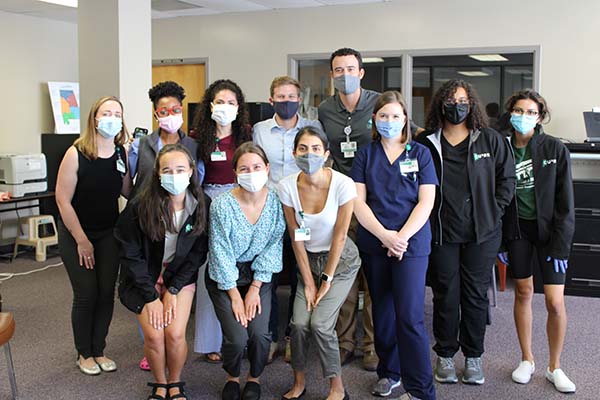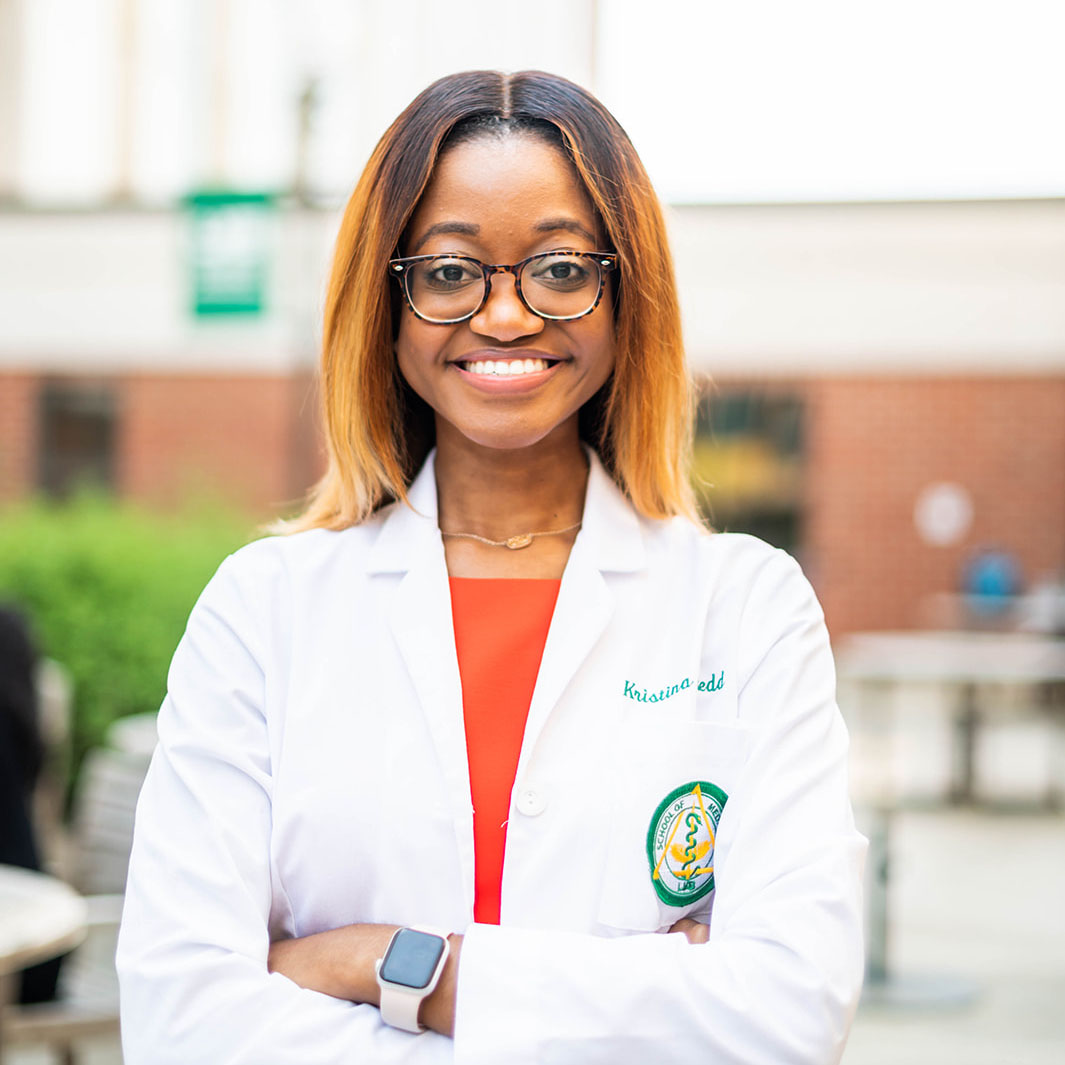
In part one of the Heersink School of Medicine’s Office for Diversity and Inclusion’s Black History Month Series, see how a UAB Department of Family and Community Medicine program is helping students to understand the history of racism in medicine and to create better patient experiences – and healthier communities – going forward.
February, Black History Month, offers another occasion to turn the spotlight on disparities in health care, particularly when it comes to the care that Black and African American patients receive in doctor’s offices and hospitals across America.
The COVID-19 pandemic has highlighted inequities in care, but the problem is wider and deeper. Currently, statistics from the Centers for Disease Control and Prevention show that African Americans are more likely to die at all ages from all causes, and more young African Americans are living with chronic diseases, such as high blood pressure or diabetes, than individuals of other races.
Reducing those rates and improving care for Black and African American populations requires, among other things, caring and culturally competent primary care physicians who are committed to working in medically underserved communities and helping patients access both treatments and – critically – preventative care.
That is one goal of the Comprehensive Urban Underserved and Rural Experience, or CU2RE, program run out of UAB’s Department of Family and Community Medicine. Started in 2020 with a $7 million grant from the Health Resources Services Administration, CU2RE aims to enhance the recruitment, training, and retention of medical students dedicated to serving urban underserved and rural populations through family medicine and primary care.
Now in its second year, CU2RE has expanded rapidly, earning $5.2 million in supplemental funding and nearly tripling in size as 15 MS1 students joined the program, along with the inaugural cohort of eight students.
“What is unique about the CU2RE program is that we attract students who have a passion for addressing health care disparities. The CU2RE curriculum provides a framework and the necessary resources that will better prepare our students to be agents of change within our communities,” said Adrienne Fowler-Payne, CU2RE program director. “We recognize that inequities exist in medicine and society and understand that to be effective change-makers, we all must play a role in participatory learning and advocating for the most vulnerable populations in our society.”
To help build the pathway of medical students that might share this same passion, CU2RE leads seminars for programs such as VIPMed. This virtual immersion experience, facilitated by the Heersink School of Medicine Office for Diversity and Inclusion student affairs team, focuses on strengthening the pathway of underrepresented in medicine (URiM) from pre-med to medical school.
CU2RE students benefit from hands-on clinical experience with a 10-patient panel, dedicated mentorship from a faculty member, and an enriched training program with modules that, among other core areas, address social determinants of health and cultural and linguistic competency. The module “From Race, Racism and Racialized Medicine to Anti-Racism,” for example, includes a look at population-level health inequities alongside perspective and stories from patients and medical providers. The module also goes through specific examples of medical racism in history, demonstrating how a long legacy of injustice and mistreatment has contributed to distrust in medicine.
To supplement the modules, 2021 CU2RE students also took part in a special six-week summer program that, along with clinical and research elements, included time spent discussing health disparities, social determinants of health, racism in medicine, intersectionality, and more. Students also toured civil rights landmarks and museums in Birmingham and Montgomery, reinforcing lessons learned through the CU2RE modules.
Shyla K. Fields, MBA, incoming director of the Office of Identity, Inclusion and Collective Conscience (I2C2), is responsible for leading the CU2RE program’s anti-oppression discussions and racism modules alongside other program staff. I2C2 uses a highway analogy to help students and department staff understand available pathways of engagement with anti-oppression and advocacy efforts. The intent is to show that while each person may be at a different stage or pace, the expectation is that all are committed to staying on this important road and seeking equity and justice for patients and communities.
“We're all on a multi-lane highway that fights against racism and other forms of oppression,” Fields said. “There are multiple entry points, variable speeds, and lanes to let everyone choose and change lanes when they're ready. We can share the road with the highway and keep an eye out for one another with varying levels of experience, skill sets, and awareness.”
The highway analogy was developed by Brandi Shah, M.D., MPH, assistant professor, and 2020-2021 director of I2C2. She and Fields developed resources to help medical students better understand racial disparities in medicine. Courses on these topics, Fields pointed out, will help future physicians relate to, treat, and see marginalized communities.
“We believe that a well-rounded physician must be aware of inequities within medicine and act as agents of change, one patient at a time, to counter these inequities,” she said.
 Kristina Redd, MS2CU2RE student Kristina Redd, now in her second year of the program, said that, as a Black woman whose family is from the Union Springs/Tuskegee area (she was raised in Phenix City), she was “already intimately familiar with how health disparities can interrupt a community, a patient population, and an individual’s life,” pointing out the Tuskegee syphilis study, notorious for the harm it inflicted on African American men, took place near her family.
Kristina Redd, MS2CU2RE student Kristina Redd, now in her second year of the program, said that, as a Black woman whose family is from the Union Springs/Tuskegee area (she was raised in Phenix City), she was “already intimately familiar with how health disparities can interrupt a community, a patient population, and an individual’s life,” pointing out the Tuskegee syphilis study, notorious for the harm it inflicted on African American men, took place near her family.
“The mistreatment and mishandling of health care research upon Black and Brown bodies constructed distrust for medicine among Black Americans that echoes today, exactly 50 years after the experiment's end,” Redd said. “What does that look like today? Skepticism towards medical attention, feeling unheard by health care practitioners, poor efforts towards the community to rebuild health literacy and health agency. These disparities have been highlighted even now throughout the COVID-19 pandemic.”
As a future physician, Redd said she tries to keep areas like her hometown in mind, relating what she is learning in her courses to the effects she sees in her community.
“As a physician, my work surrounds rebuilding the lost trust, standing as an advocate in grassroots measures and policy-driven methods, and overall, creating a safe environment where Black and Brown patients feel comfortable with having a choice in choosing me as a physician who ‘looks like them.’ Often, I feel as if medicine underscores the importance of sociocultural familiarity and healing. I foresee transcending this barrier and using it as an opportunity to teach health agency and health literacy will transform communities and lessen health disparities one disadvantaged community at a time.”
CU2RE, Redd said, has added depth to her medical education.
“Not only does CU2RE provide monthly modules and discussions pertaining to Alabama's health disparities and measures in primary care, but this summer, we visited Montgomery's Legacy Museum to actualize the historical context of how these inequities originated. Additionally, we CU2RE students are fortunate to provide care to patients at free or sliding-scale fee clinics with missions to provide affordable, thorough care,” Redd said. “Our monthly check-ins are not just ‘check-ups,’ but they also allow for establishing goals for our patients that will allow them to really focus on their health and well-being. We are looking holistically at our patients -- their health battles, their circumstances, and how we can work together in spite of those.”
Jill Marsh, M.D., director of the urban underserved and rural pathways in the CU2RE program, said that her leadership in CU2RE has included the process of “unlearning and relearning how to be an advocate,” and how to address inequities as a leader with students and in her clinical practice.
Going forward, CU2RE program leaders plan to continue expanding partnerships across the state while using the HRSA supplemental funding to increase educational activities for medical students, redesign the family medicine clerkship curriculum across all UAB regional campuses, provide CU2RE students with stipends to offset medical education costs and implement new faculty, staff and student development initiatives. The program’s growth also includes a network of community preceptors in clinics around Alabama, serving a wide range of urban and rural communities.
“Expanding the reach of the CU2RE program is an important way we can address gaps and disparities in health care in our state and begin to address the large and deeply-rooted problems of systemic inequity and racism in health care,” said Irfan Asif, M.D., professor and chair of the Department of Family Medicine, associate dean for primary care and rural health and principal investigator for the CU2RE grant.
“Primary care providers have a duty to provide the very best care possible for their patients and reckoning with the history of racism and inequity that many of their patients have faced is part of that. By educating our students on the realities that our patients face, we can take steps toward a better health care system and healthier future for our patients.”